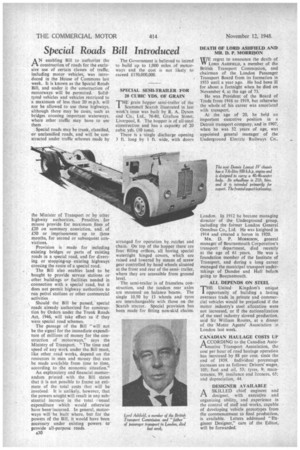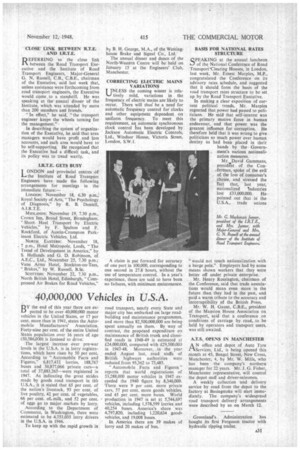Special Roads Bill Introduced
Page 32

Page 33

If you've noticed an error in this article please click here to report it so we can fix it.
AN enabling Bill to authorize the construction of roads for the exclusive use of certain classes of traffic. including motor vehicles, was introduced in the House of Commons last week. It is known as the Special Roads Bill, and under it the construction of motorways will be permitted. Solidtyred vehicles and vehicles restricted to a maximum of less than 20 m.p.h. will not be allowed to use these highways, although there may be cases, such as bridges crossing important waterways, where other traffic may have to use them
Special roads may be trunk, classified, or unclassified roads, and will be constructed under traffic schemes made by the Minister of Transport or by other highway authorities. Penalties for misuse provide for maximum fines of £20 on summary conviction, and of £50 or imprisonment up to three months, for second or subsequent convictions.
Provision is made for including existing bridges or parts of existing roads in a special road, and for diverting or slopping-up existing highways crossing the route of a special road.
The Bill also enables land to be bought to provide service stations or other buildings or facilities needed in connection with a special road, but it does not permit highway authorities to run petrol stations or other commercial activities Should the Bill be passed, special roads already authorized for construction by Orders under the Trunk Roads Act, 1946, will take effect as if they were special road schemes.
The passage of the Bill "will not be the signal for the immediate expenditure of millions of money for the construction of motorways," says the Ministry of Transport. "The time and speed of any work under the Bill must, like other road works, depend on the resources in men and money that can be made ave.:bible from time to time, according to the economic situation."
An explanatory and financial memorandum printed with the Bill states that it is not possible to frame an estimate of the total costs that will be involved. It is unlikely, however, that the powers sought will result in any substantial increase in the total rnnual expenditure which would otherwise have been incurred. In general, motorways will be built where, but for the powers of the Bill, it would have been necessary under existing powers to' provide all-purpose roads.
*30 The Government is believed to intend to build up to 1,000 miles of motorways and the cost is not likely to exceed £150,000,000.
SPECIAL SEMI-TRAILER FOR 20 CUBIC YDS. OF GRAIN
THE grain hopper semi-trailer of the Scammell Scarab illustrated in last week's issue was built by R. A. Dyson and Co. Ltd., 76-80, Grafton Street, Liverpool, 8. The hopper is of all-steel Construction and has a capacity of 20 cubic yds. (10 tons).
There is a single discharge opening 3 ft. long by 1 ft. wide, with doors arranged for operation by ratchet and chain. On top of the hopper there are four filling orifices, all having special watertight hinged covers, which are raised and lowered by means of screw gear controlled by hand wheels situated at the front and rear of the semitrailer, where they are accessible from ground level, The semi-trailer is of frameless construction, and the tandem rear axles are mounted on balance beams. The single 10.50 by 13 wheels and tyres are interchangeable with those on the Scarab tractor. Special provision has been made for fitting non-skid chains. DEATH OF LORD ASHFIELD,AND MR. D. P. MORRISON
WE regret to announce the death of VY Lotto ASTIF1IRLD, a member of the British Transport Commission, and chairman of the , London Passenger Transport Board from its formation in 1933 until a year ago. He had been ill for about a fortnight when he died on November 4, at the age of 73.
He was President of the Board of Trade from 1916 to 1919, but otherwise the whole of his career was associated with transport.
At the age of 20, he held an important executive position in a Detroit transport company, and in 1907, when he was 32 years of age, was appointed general manager of the Underground Electric Railways Co„
London. In 1912 he became managing director of the Underground group, including the former London General Omnibus Co., Ltd. He was knighted in 1914 and created a baron in 1920.
MR. D. P. MORRISON, general manager of Bournemouth Corporation's transport department, died recently at the age of 61 years. He was a foundation member of the institute of Transport, and during a long career managed the municipal transport undertakings of Dundee and Hull befort going to Bournemouth.
ALL DEPENDS ON STEEL
THE United • Kingdom's unique opportunity of building a lasting overseas trade in private and commercial vehicles would be prejudiced if the motor industry's steel allocation were not increased, or if the nationalization of the steel industry slowed production. said Sir William Rootes, at a dinner of the Motor Agents' Association in London last week.
CANADIAN HAULAGE COSTS UP A CCORDING to the Canadian Auto-rtmotive Transport Association, the cost per hour of road haulage operation has increased by 88 per cent. sinee the end of 1939. Individual percentage increases are as follows: Drivers' wages, 105; fuel and oil, 53; tyres, 9; maintenance, 99; insurance and licences, 65; and depreciation, 44.
DESIGNER AVAILABLE
ASKILLED chief engineer and designer, with executive and organizing ability, and experience in the control of staff and works, capable of developing vehicle prototypes from the commencement to final production. is available. Letters addressed "Engineer Designer," care of the Editor, will be forwarded.
CLOSE' LINK BETWEEN R.T.E. AND I.R.T.E.
REFERRING to the close link between the Road Transport Executive and the Institute of Road Transport Engineers, Major-General G. N. Russell, C.B., C.B.E, chairman of the Executive, said last week that, unless assistance were forthcoming from road transport engineers, the Executive would come to a standstill. He was speaking at the annual dinner of the Institute, which was attended by more
than 200 members and friends. • "In effect," he said, "the transport engineer keeps the wheels turning for the management."
In describing the system of organization of the Executive, he said that area managers would have profit and loss accounts, and each area would have to be self-supporting. He recognized that the Executive had a difficult task, and its policy was to tread warily.
I.R.T.E. GETS BUSY
LONDON and provincial centres of La the Institute of Road Transport Engineers have made the following arrangements for meetings in the immediate future:—
LONDON: November 18, 6.30 p.m.,• Royal Society of Arts," The Psychology of Diagnosis," by R. B. Daniell, A.1.R.T.E.
MIDLANDS: November 19, 7.30 p.m., Crown Inn, Broad Street, Birmingham, " Short Haut "transport by Electric Vehicles," by F. Spalton and F. Rockford, of Austin-Crompton Parkinson Electric Vehicles, Ltd.
NORTH EASTERN: November 18, 7 p.m., Hotel Metropole, Leeds, "The Trend of Development in America," by S. Hollands and G. D. Robinson, of A.E.C., Ltd., November 25, 7.30 p.m.; Vane Aims Hotel, Stockton-on-Tees, "Brakes," by W. Russell, B.Sc.
Scorrtstt: November 22, 7.30 p.m., North British Hotel, Edinburgh, "Compressed Air Brakes for Road Vehicles," by B H. George, M.A., of the Westinghouse Brake and Signal Co., Ltd; The annual dinner and dance of the North-Western Centre will be held on January 15 at the Engineers' Club, Manchester.
CORRECTING ELECTRIC MAINS VARIATIONS
UNLESS the coming winter is relatively mild, variations in the frequency of electric mains are likely to occur. There will thui be a need for automatic frequency control for clocks and other equipment dependent on nniform frequency. To meet this requirement, an automatic synchronous clock control tas been developed by Jackson Automatic Electric Controls, Ltd., Windsor House, Victoria Street, London, S.W.!.
A claim is put forward for accuracy of one part in 100,000, corresponding to one second in 27.8 hours, without the use of temperature control. In a year's experience, there are said to have been no failures, with minimum maintenance. BASIS FOR NATIONAL RATES STRUCTURE QPEAKING at the annual luncheon L.1 of the National Conference of Road Transpori•Clearing Houses, in London, last week, Mr. Ernest Marples, M.P., congratulated the Conference on its advisory rates schedule, and suggested that it should form the basis of the road transport rates structure to be set up by the Road Transport Executive.
In making a clear exposition of current political trends. Mr. Marples regretted that power had passed to politicians. He said that self-interest was the primary motive force in human endeavour, and that power was the greatest influence for corruption. He therefore held that it was wrong to give politicians so much power over human destiny as had been placed in their hands by the Government's various nationalization measures.
Mr. David Gammans, president of the Conference, spoke of the evil of the loss of consumer's choice, and stressed the fact that, last year, nationalized Industries lost £33,000,000. He pointed out that in the U.S.A., trade unions "would not touch nationalization with a barge pole." Employers had by some means shown workers that they were better off under private enterprise.
Mr. Henry Rossington, chairman of the Conference, said that trade associations would mean even more in the future than they had in the past, and paid a warm tribute to the accuracy and incorruptibility of the British Press.
Mr. W. H. Gaunt, C.B.E., president of the Mansion House Association on Transport, said that a conference on conditions of carriage by road, to be held by operators and transport users, was still awaited.
A.T.S. OPENS IN MANCHESTER
AN office and depot of Auto Tyre Services, Ltd., is being opened this month at 45, Bengal Street, New Cross, Manchester, 4, by Mr. W. Mills, who has been the company's northern manager for 22 years. Mr. J. G. Fisher, Manchester representative, will control the depot staff and driver-salesmen.
A weekly collection 'and delivery service by road from the depot to the factory at Basingstoke will start immediately. The company's widespread road transport delivery arrangements were described by us on March 12.
Greenland's Administration has bought its first Ferguson tractor with hydraulic tipping trailer.




























































































